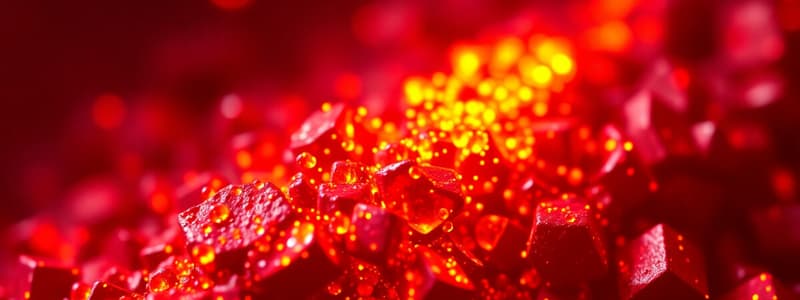Podcast
Questions and Answers
What is the primary purpose of the spectro lab?
What is the primary purpose of the spectro lab?
- To manufacture wheels directly
- To analyze the composition of metal samples (correct)
- To create electric arc furnaces
- To conduct research on tungsten electrodes
Which instrument is used for testing the metal samples?
Which instrument is used for testing the metal samples?
- ARL Metal Analyzer (M-402) (correct)
- Infrared Spectrophotometer
- Gas Chromatograph
- Mass Spectrometer
Which element is NOT listed among the acquired element compositions?
Which element is NOT listed among the acquired element compositions?
- Copper
- Silicon
- Titanium
- Boron (correct)
What phenomenon is employed to excite the electrons in the sample?
What phenomenon is employed to excite the electrons in the sample?
What is one of the main advantages of using an optical emission spectrometer?
What is one of the main advantages of using an optical emission spectrometer?
What principle does the hydrogen testing machine operate on?
What principle does the hydrogen testing machine operate on?
What atmosphere is used during the spark discharge process?
What atmosphere is used during the spark discharge process?
How does the intensity of the emission spectrum correlate with the sample?
How does the intensity of the emission spectrum correlate with the sample?
How does nitrogen gas contribute to the functioning of the hydrogen testing machine?
How does nitrogen gas contribute to the functioning of the hydrogen testing machine?
What percentage of PLC does RWF use in its processes?
What percentage of PLC does RWF use in its processes?
What does the emission spectrum consist of?
What does the emission spectrum consist of?
What was noted as a fascinating machine during the internship?
What was noted as a fascinating machine during the internship?
What role do photo multiplier tubes play in the analysis?
What role do photo multiplier tubes play in the analysis?
Which type of electrodes is involved in the optical emission spectrometry process?
Which type of electrodes is involved in the optical emission spectrometry process?
What distinguishes the Electric Arc Furnace from other furnaces?
What distinguishes the Electric Arc Furnace from other furnaces?
What type of testing method is described as 'magnaglo testing'?
What type of testing method is described as 'magnaglo testing'?
What effect does the excitation source have on the metal sample?
What effect does the excitation source have on the metal sample?
What best describes the process used in optical emission spectrometry?
What best describes the process used in optical emission spectrometry?
Which of the following is a characteristic feature of the advanced processes used at RWF?
Which of the following is a characteristic feature of the advanced processes used at RWF?
What aspect of the internship did the participants find thought-provoking?
What aspect of the internship did the participants find thought-provoking?
Flashcards
Optical Emission Spectrometry
Optical Emission Spectrometry
A technique used to determine the composition of metals in a sample by analyzing the light emitted from excited atoms.
ARL Metal Analyzer (M-402)
ARL Metal Analyzer (M-402)
A type of instrument used in spectro labs to analyze metal samples.
Discharge Plasma
Discharge Plasma
A high-energy state created by applying electrical energy to a metal sample, causing atoms to emit light.
Excitation Source
Excitation Source
Signup and view all the flashcards
Emission Spectrum
Emission Spectrum
Signup and view all the flashcards
Diffraction Grating
Diffraction Grating
Signup and view all the flashcards
Detectors (Photo multiplier tubes)
Detectors (Photo multiplier tubes)
Signup and view all the flashcards
Qualitative and Quantitative Analysis
Qualitative and Quantitative Analysis
Signup and view all the flashcards
Intensity of Emission Spectrum
Intensity of Emission Spectrum
Signup and view all the flashcards
Spectrochemical Analysis in Wheel Manufacturing
Spectrochemical Analysis in Wheel Manufacturing
Signup and view all the flashcards
Wheatstone Bridge
Wheatstone Bridge
Signup and view all the flashcards
Hydrogen Testing
Hydrogen Testing
Signup and view all the flashcards
Programmable Logic Control (PLC)
Programmable Logic Control (PLC)
Signup and view all the flashcards
Computer Numerical Control (CNC)
Computer Numerical Control (CNC)
Signup and view all the flashcards
Electric Arc Furnace
Electric Arc Furnace
Signup and view all the flashcards
Magnaglo Testing
Magnaglo Testing
Signup and view all the flashcards
Forging
Forging
Signup and view all the flashcards
Furnace
Furnace
Signup and view all the flashcards
Heat Treatment
Heat Treatment
Signup and view all the flashcards
Study Notes
Spectro Lab
- The lab tests samples (solidified metal) obtained from an electric arc furnace to analyze metal composition.
- ARL Metal Analyzer (M-402 optical emission spectrometer) is used for this analysis.
Optical Emission Spectrometry (OES) Principle
- OES applies electrical energy (spark) between electrodes (tungsten) and a metal sample.
- This vaporizes atoms, bringing them to a high energy state (discharge plasma).
- Excited atoms/ions in the plasma create unique emission spectra specific to each element.
Working of OES
- Sample is placed between tungsten electrodes.
- An electric arc is created, exciting electrons.
- ICP (inductively coupled plasma) used as excitation source.
- Spark, direct current arc, or glow discharge used to generate excitation.
- Statistical processing of spark discharge spectra is done in an inert (argon) atmosphere.
- Unique emission spectra are obtained.
Spectral Analysis
- The emitted light is split by a diffraction grating.
- This isolates spectral lines, extracting the emission spectrum of target elements.
- Intensity of each element's emission spectrum is linked to its concentration in the sample.
- Detectors (photomultiplier tubes) measure the presence/absence and intensity of the spectrum.
- Qualitative and quantitative analysis of elements is performed based on extracted data.
Elements Analyzed
- Carbon
- Manganese
- Silicon
- Phosphorous
- Sulphur
- Chromium
- Nickel
- Copper
- Molybdenum
- Aluminium
- Vanadium
- Lead
- Titanium
- Tin
Advantages of Optical Emission Spectrometry (OES)
- High speed
- High accuracy
- High precision
- Low detection limits
- Easy integration and efficiency.
Hydrogen Testing Machine
- Tests for hydrogen and other supplementary gases.
- Based on Wheatstone bridge principle.
- Measures unknown electrical resistance using known resistors.
- Nitrogen gas maintained at constant rate for resistance equalization.
- Hydrogen diffusion rate determined based on normal distribution within Anhydrone.
Conclusion - Internship
- The internship focused on implementing theoretical concepts on a large scale.
- Machine operation and work flow within RWF were emphasized.
- RWF uses 95% programmable logic controllers (PLC) and advanced processes use computer numerical control (CNC).
- Long forging machine's power drive and capacity/plastic deformation are noted.
- Wheel shop's Electric Arc Furnace process is unique (direct arc exposure of charge).
- Electromechanical overhead travelling cranes (EOTs) were helpful in applications and mechanical understanding.
Studying That Suits You
Use AI to generate personalized quizzes and flashcards to suit your learning preferences.
Related Documents
Description
Explore the principles and workings of Optical Emission Spectrometry (OES) in analyzing metal compositions. This quiz covers the application of electrical energy in producing unique emission spectra and the processes involved in spectrochemical analysis. Test your knowledge of the technology and methodologies utilized in the metal testing process.




